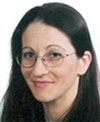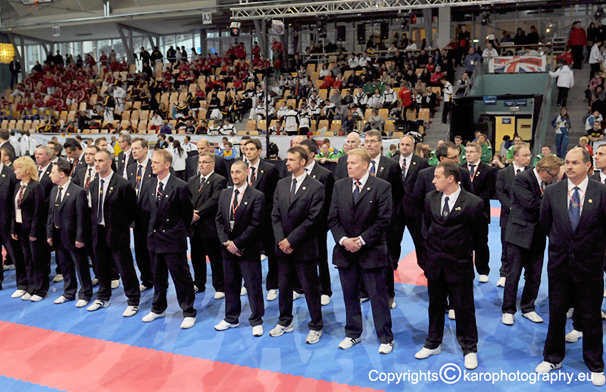
The Tournament & Umpire Committee plan and coordinate the most important and prestigious tournament in Europe - European Championship. Run smoothly in positive atmosphere, the competition depends on the Committee’s professionalism, knowledge, and attitude as well as their organisational and interpersonal skills.
Chairman of the T&U Committee, Mr Philip Lear and its members including Master James Tjin-A-Ton, Master Sandy Dunbar, and Mr Sven Heinrich worked very hard before and during the last European Championship held in Maribor, Slovenia. They unquestionably did an outstanding job, and we simply can’t imagine next European Championships without them. The Committee received countless compliments after the last tournament and we are happy to hear also some opinions from them and learn more about their duties.
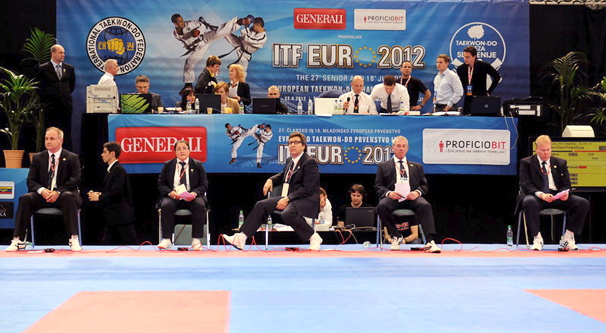
Mr Philip Lear, Chairman of the Tournament & Umpire Committee
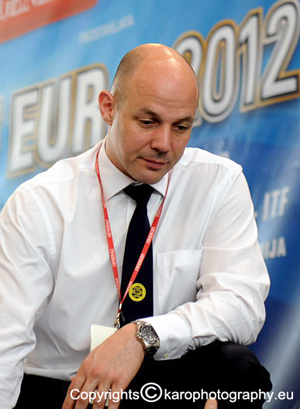
- Sir, the European Championships in Maribor is your second tournament as Chairman of the Tournament & Umpire Committee. Would you say that you still like to do it? Is that kind of ‘job’ challenging you in any way?
I only took on the role on a temporary basis after Master Coos Van den Heuval resigned his position. The idea was to just do the job initially in Slovakia as there were only 6 weeks to prepare. Those Euros went well and I was asked if I would be prepared to do the job one more time in Slovenia before a new Committee would be voted in for the next term. I happily agreed and although the job is very stressful and there is no rest from the moment I arrived until I left, I thrived on the challenge and relished seeing the happy faces of those who enjoyed the Euros and the job that we did. It's a really exciting job to have and if I get the confidence of the AETF Board of Directors then I would like to continue for the next term with the same Committee.
- The line-up of the Committee is different from the one in Bratislava at the last European Championships. Could you introduce the members of the Committee at the European Championships in Maribor, Slovenia?
With pleasure, first of all it was important that I asked people that I trusted, that knew their job and also that I knew I could work well with, so firstly I invited Master James Tjin-A-Ton 8th Degree from the Netherlands. He has many years experience as one of Europe's and the World's most qualified Jury Presidents, he is a well respected Umpire who also has excellent interpersonal skills and is able to communicate to people of all backgrounds, he has a calm personality that instills confidence in others. Secondly I asked Mr Sven Heinrich 6th Degree from Germany. I have known Mr Heinrich for many years both as a competitor and an Umpire, he is a police officer in the German CID and is an ideal member for the Committee as he is a strict and focused person who is very good at finding solutions to problems and ensuring that people follow the rules whilst staying very calm at all times. His knowledge of the German Electronic scoring systems was also ideal as he was able to create a document to help train future computer operators of the system and provide backup to Mr Roland Wilke.
Finally, to create some continuity from the last committee, I asked Master Sandy Dunbar 7th Degree from Scotland to be there to advise and consult the new Committee on the various aspects of running the Euros. Master Dunbar has had many years experience on the AETF T & U Committee and is well respected throughout the world as one of the most experienced referees in the ITF. It was a real pleasure to work one more time with him, his calmness, knowledge and professionalism is second to none. He will now work solely for the ITF.
- You were to plan the whole tournament. Was there any serious problem in the preparation process? If there were any problems, please, could you tell me the gravest one?
The two Euros I have been Chairman for I have spent a lot of my personal time at home putting together the schedule. One of the first changes I wanted to make was to ensure that competitors would not be participating in two events at the same time. As an ex competitor I know the amount of time the athletes put into preparing for each event and that you must be in the right mindset to give yourself the best opportunity for success, this took some extra time and I cross referenced many categories to ensure this didn't happen and I have now managed to do this in both the Euros. In these last Euros I wanted to also give the teams a chance to only go for the Team Power Test once they were eliminated and this also included waiting until after the finals. This worked very well and at both Euros, when the Team Sparring finals were finished I made the focus the Team Power Test by narrating each break as it happened, this helped to make the event very special and emotional for all of those taking part. As far as problems, well we had some, but we found many solutions to all of the problems so they weren't problems anymore.
- What were your duties as head of Tournament & Umpire Committee from the time of your arrival in Maribor?
For me the job started at the end of January after the AETF Board of Directors agreed for me to be Chairman one more time. This started with many emails to the organisers who were always professional in their preparations and I would like to congratulate Mr Tomaz Barada, Mr Hasan Ibric and Mr Jan Creslovnik for a fantastic job as they were a pleasure to work with.
As soon as the new Committee arrived we started with a meeting at the Hotel Piramida, then at 6pm Mr Sven Heinrich conducted a training session for the Slovenian computer operators with Mr Roland Wilke from Germany. Whilst this was happening the other Committee members prepared the ring councils and discussed the Umpire and Coach meetings in depth. After dinner we continued our meeting until late and then prepared the weighing in room for the morning.
Thursday was an early start with the weighing in and then the Umpire and Coach meetings, then dinner and then 3 of us attended the Congress until very late. Each morning we would run an Umpire meeting at 8am with 2 Committee members whilst the other 2 went to the hall to prepare everything. On all the days the umpires were ready on the ring councils at 8.50am to start at 9am except for Sunday when the umpires were not collected by the bus, but we were able to start at 9.15am that day, but the schedule still ran smoothly. At the end of each day the Committee would ask for feedback from the Jury Presidents and we would then have our own meeting each evening to discuss improvements for the following day.
- Have you received any protests during the competition? Were they difficult to decide?
Yes, we did. Protests are always difficult to deal with, especially as in many cases you can understand why coaches put in a protest, however we have to follow the rules that are written down and listen to the evidence from the Jury President, Centre Referee and sometimes Corner Referees, then make a judgment based on all of that evidence. Our Committee will always make a unanimous decision together so no verdicts are made by one person. There were just two occasions when the protest went on too long, even after the decision was taken. This is something that won't happen again in the future and once a decision has been taken the ring council must continue the event. You certainly don't become the most popular person in the world when you give decisions on protests, but in all cases I found the coaches to show professionalism of the highest caliber, which meant that when the situation was over then that was it, they moved on.
- Have you received any positive or maybe negative opinions regarding the referees? Do you take note of them?
In general the opinions have been good, there will always be some people who don't agree with a decision an umpire makes as in sports like football. We see this when a referee gives a goal when it isn't and also the other way when it is a goal and it's not given, once there was a football referee who gave 3 yellow cards in one match at a Euros. Referees are human and mistakes can happen, our job is to try to ensure that at each Euros there are less and less mistakes. Now that we are in an age where coaches and competitors can see all of the scores it's easier to see mistakes that are made, but all I can say is our referees will become better and better and we are always looking for how the umpires perform on the European stage and to help them to become the best they can.
- What sort of change or improvement would be immediately helpful for the competition?
There is a lot of talk right now of video evidence in all sports. I am unsure how this could work in an AETF Euros, but one idea would be to have one camera view set by the organising committee that can be referred to if required by the T & U Committee in extreme cases and if the evidence is inconclusive then the result would come only by the usual process. The problem could be that coaches could want to stop and look at the camera angle every bout, so we could suggest that as in Tennis that each National Team would only get one Video referral per day, once it's used up they could not do one until the next day. To be honest there are never that many protests during a Euros, so we are only talking about one or two extreme situations. The problem is this would mean an extra cost for the organiser as they would need a camera for each Square as well as a recording device for each camera and then someone to look after them. I'm not 100% convinced, but it's certainly an interesting conversation. Realistically though I think more Umpire courses in Europe and maybe even a selection process for the Umpires would improve the Euros, so in fact it doesn't matter which country they come from, we just have the best and most experienced umpires who are completely neutral and take their job very seriously. The majority of our Umpires are like this, we just need to ensure that we give them the best opportunities to develop further.
- Has the cooperation with and between members of the Committee always gone smoothly?
I feel very lucky to be working with the Committee members that I do. We spent a lot of time together and although most of the time it was all very serious to ensure the smooth running of the Euros we were also able to relax and share some jokes. This is an essential part of the success of our Committee as we all trust each other and respect each other’s opinions.
- Sir, now you are at the main table. Have you had any chance to watch the rivalry on the mats?
I spent so much of my time with my head looking at the draws and preparing the paperwork for each ring council that I didn't get to see much of the Euros, although I think that I had the best seat in the house for the finals, I thought the Male -71Kgs final was very exciting and an excellent display of ITF Taekwon-Do at it's most competitive. I had a few of my own students participating and I tried to watch their bouts, but only as a neutral, so you wouldn't have seen much emotion from me, but inside I was going crazy!
- How much time do you need to recover after an event like the European Championship? Would you be able to do this job again next week if you were ask to?
When it got to Sunday night the whole Committee were shattered. I had two meetings in the evening, with the second meeting finishing about 10.45pm so I didn't have the energy to go and meet people at the party. We all just relaxed at the hotel and had a quiet evening chatting and joking with some of the other Umpires. When the Euros were over it was like a massive weight was lifted as I wanted to do the best job I could to help make memorable experiences for everyone. Even with the few problems we had, the Euros still ran to schedule, but it took some hard work to calculate how we could move categories to keep everything moving whilst keeping all of the coaches informed at all times. I think if I was asked to do it again straight away, I probably could, but I would not be in my wife's good books and I would probably have to promise her an expensive shopping trip, so I think once a year is fine.
Master James Tjin-A-Ton, Member of the Tournament & Umpire Committee
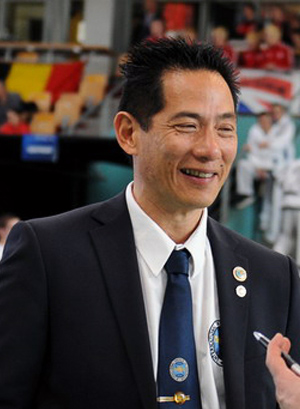
- Sir, what have been your duty since the time of your arrival in Maribor?
A meeting with the other members on Wednesday evening, prepare the ring councils, and discuss the weighing in procedure. On Thursday: the Weight in procedure, the Umpires meeting, and the Coach meeting.
Every day we started with a meeting, and I was also responsible for to evaluate the day with the JP, make new ring councils. During the competition my job was to support all the ring councils in any way: from clearing the competition area, arranging a stopwatch to taking care of refreshment for the umpires. My duty was also to advice about the Umpire rules, and make sure that the points were deduced when a point was given incorrectly.
- Which tasks were the hardest before and during the tournament?
The long days from 7am for breakfast till 10.30pm, and especially the day of the congress, were very hard. To be everywhere at any time, and see everything was hard too. Furthermore, the protests from the coaches. As a Committee we have the responsibility to make the best decisions. We have to listen the coaches, JP, centre referee, and corner referees very carefully.
- You were in face to face contact with the referees. Have they been treated properly? Are the referees happy with conditions under which they worked and rested?
There was no Umpire room in the Sports Hall. The lunch was a little bit basic with no options for vegetarians. Also, the lunch was outside - when temperature is ok then there is no problem, but with the rain is more difficult and not nice. Lunch for referees was at the same place as the competitors and general public. Two times there was no transportation for umpires due to communication problems.
- Is there anything that would help the referees in their very responsible and hard work during the championships?
Yes - more training and courses. Each country must send A Umpires and not B. Not only 45 Umpires, but at least 50 should be present during the competition, so they have enough time to rest and relax. Appreciation and respect from supporters, competitors, and coaches would help too.
- Apart from some very good opinions, there have also been some ‘not the best’ ones regarding the referees’ work. Have they noticed and tried to discuss them and maybe find ways to improve in the future?
Yes. As a committee we have made a lot of recommendations to the AETF.
- What kind of issues, if there were any, caused the most tension, emotion or misunderstanding between referees and coaches/competitors?
There were couple of things. Before competition it was fact that the Italian team arrived after closing time of the weight in procedure. During the tournament: what is a killing attack in prearranged sparring; deducting the scoring points when the technique was not correct; giving the right warnings and in time, because a competitor can lose a match very easily with too many warnings.
- As a member of the Tournament & Umpire Committee, do you ever wonder what could be done to hold referee's work and its quality in the highest regard possible?
Like a competitor, an umpire must be prepared for the championship. It is the responsibility for every country that they send the best Umpires from their National Associations. We, as the T&U Committee, do not have enough time at the European Championship to train them or run an umpire course. With a questionnaire we tried to be very interactive, so everybody has the same ideas about the most common Umpires rules.
- Sir, would you like to add something I didn’t ask you about?
The German electronic system worked very well - especially the back-up system, when we had to recover some scores. Each day scheduled with almost every part of Taekwon-Do: pattern, sparring, power test, and special techniques. I think it would be the time that, just as the doboks for the competitors, umpires must have the same Umpire look - from ties to shoes.
Mr Sven Heinrich, Member of the Tournament & Umpire Committee
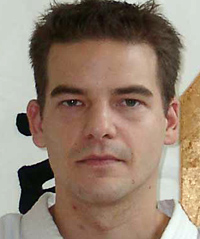
T&U Committee Member
- Sir, what have been your duty since the time of your arrival in Maribor?
I started with a small meeting with other members of the T&U Committee. After that Mr. Wilke and myself had to give people training for computer system. This course lasted for 1,5 hours, during which we explained various situations that can happen in a competition and what are the duties of people working with the computer. It was nice to see that there were enough people from the Slovenian Association who were interested to do the computer work, and all of them were competitors - so they knew competition rules very well. After that training I joined other Committee members, who were already working on creating the ring councils. On Thursday we did the Weight In Procedure, the Umpire and Coach Meeting. During the Umpire Meeting we trained the umpires and the ‘computer people’ with the ITF electronic scoring system, so everyone could feel comfortable with the system. I started every day in the hall building up the electronic scoring system and checking it up. During the competition I shared the duties with Master Tjin-A-Ton and Master Dunbar.
- Which tasks were the hardest before and during the tournament?
Working as a member of the T&U Committee was very exciting and different than my previous role at competitions as an umpire. Working as a referee in the past I was focused on the tournament from the start in the morning until the end in the evening, but as a committee member there was no free time since my arrival in Maribor on Wednesday till Sunday night after our Committee meeting. The other not easy thing was to take a fair and proper decision with every protest.
- You were in face to face contact with the referees. Have they been treated properly? Are the referees happy with conditions under which they worked and rested?
All in all, I think the umpires were treated very fair by the coaches and competitors. We have to remember that the referees have to do a very hard and difficult job to take a decision, and sometimes they have to do it in a split second - and this decision can change the result of the bout. In this case the supporters have another opinion of who is the winner and it is very easy for them to doubt on the umpires. That is hard for the umpires to handle with those things.
Some inconvenience for the referees was that there was no separate room for them where they could rest in peace from the tournament.
- Is there anything that would help the referees in their very responsible and hard work during the championships?
The umpires have to train as the competitors have. The competitors train so many hours to get in best shape for every competition, they have to repeat every movement in pattern or combination in sparring countless number of times in their preparation for a tournament. For me, the umpires have to also prepare, but in a different way. There is no need that they have to perform a pattern or do the sparring in a similar way as a European Champion does, but umpires have to know and recognize all small things - what is right and what is wrong in a pattern and when a point in sparring is scored or not. I think that all umpires should train on several national championships to get prepared for a European Championships. I think that the umpires gave the decisions in their best belief and knowledge at the Euros in Maribor.
- What kind of issues, if there were any, caused the most tension, emotion or misunderstanding between referees and coaches/competitors?
I think it is a different view of what is seen on the square. For example, a coach and supporter from country ‘A’ see a pattern or sparring bout of their competitor in their kind of view, and a coach and supporter from country ‘B’ see the same action exactly the opposite. Both supporters see only points they want to see, and the umpires stand on the borderline and have to give an independent decision.
- As a member of the Tournament & Umpire Committee, do you ever wonder what could be done to hold referee's work and its quality in the highest regard possible?
It was my first time as a member of the T&U Committee. At the Euros in Maribor we tried to develop running the umpire meeting in a different way. Every day we also tried to get a feedback from the referees of what was running well or not during that day. That was very difficult, because there was not much time for that work.
- Sir, would you like to add something I didn’t ask you about?
I would like to thank to Mr Lear that he asked me to join the T&U Committee team and let me got a different experience of a European Championship - in the past I participated in a European Championships as a competitor and an umpire.
I would also like to thank to Master Dunbar to let me learn from his huge expert knowledge of how to run such a big tournament and how to interact with the umpires.
Master Sandy Dunbar, Member of the Tournament & Umpire Committee
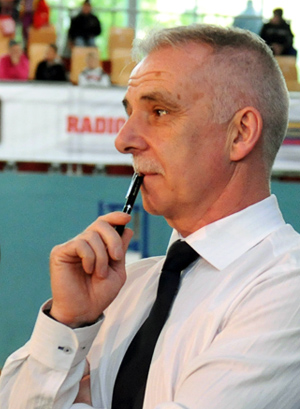
- Sir, what have been your duties since the time of your arrival in Maribor?
On arrival in Maribor, or even before, as I met Mr Lear on the flight over and we shared a coach from Graz, we were organising first the list of umpires that had registered. It is normally an easy task, but this year we had many umpires who have retired or countries that sent new, but not so experienced people to the event.
With Master James and Mr Sven Heindrich on the TU&C for the first time I was there to try and help them adjust to the new positions they were in. We spent most of Wednesday’s evening trying to place people into the best teams we could manage with a mixture of new and experienced umpires.
Thursday was the weigh in, which was very fast due to the athletes being at the proper weights and also the coaches having all documents correct. I think we had less than 6 people who had to lose some weight to compete. Also, for the first time, we had very professional weight scales.
The umpire training was on Thursday afternoon, but unfortunately one team was late arriving so I stayed for their weigh in while the TU&C did the training in the sports hall.
- Which tasks were the hardest before and during the tournament?
The hardest tasks before the tournament are always assigning the umpires into a good working team. As I said earlier, with a lot of new umpires this was quite an undertaking this time around, and with some countries sending more than 3 or 4 it is difficult to keep countries apart at times.
During the competition it is always getting the right result when a protest comes in. We can only go by the written rules and we have to be very careful, which sometimes takes a bit of time and can hold up events longer than we would like.
- You were in direct contact with the referees. Have they been treated properly? Are the umpires happy with conditions under which they worked and rested?
I think in the main the referees were treated very fair. It will always be the case that the winner thinks you are the best ever and the loser has other ideas about you. It would be nice to have had more Centre referees with experience as we had to rely on the same people for some time and they get tired and can sometimes make mistakes. The sports hall did not have a room specifically for the umpires to retire to, so we had to do the meetings in the hotel before we left in the morning, which also meant they missed out a lot on the much needed coffee they require. Hint for coaches, if you want to keep the referees happy, take plenty coffee with you!
- Is there anything that would help the referees in their very responsible and hard work during the championships?
Referees need to train also. The competitors train really hard for events, so why not the umpires? Just because you are an International umpire doesn’t mean you don’t work at National or local level. When I was an umpire I took part in all competitions just to stay sharp and I think you can tell the people that still do this and those who don’t just by their actions and postures. Sloppy hand signals always gets me annoyed and they should practice these in the mirrors to get it right. It is very important that everyone knows what you are giving the fouls and warnings for. When you are in the centre you can’t afford to be wrong, as someone’s months or years of training can go horribly wrong due to your wrong actions.
- Apart from some very good opinions, there have also been some negative ones regarding the referees’ work. Have they noticed and tried to discuss them and maybe find ways to improve in the future?
I have seen some discussion regards the referees work, but I will always support what they do. It is easy for others to criticise from the side, but in a split second they have to make a decision, and it is always easy for others to look back at videos and say something about the events. We do not have that luxury and are only human. We see what we see! Each evening the TU&C discuss events of the day and make notes for improvements for the future. With the IUC in Ireland later this year, I am sure, there will be a lot of discussion and changes soon.
- What kind of matters, if there were any, caused the most tension, emotion or misunderstanding between referees and coaches/competitors?
I think when coaches see points that umpires do not, is always a hot point. They have to remember that where they sit is not always the best angle to see things and some corner referees don’t see due to competitor or centre referee being in the way. Also, with the computer system showing the scores they sometimes see scores wrong way round, red is blue or blue is red(this has happened on many occasions believe it or not). That causes them to get agitated and then they vent their anger towards a corner judge, but they have to be aware that on the scoreboard the corners are random, only the Jury President knows which corner is scoring! I recommend all coaches go on the Umpire courses, so that they understand the rules fully.
- As a member of the Tournament & Umpire Committee, do you ever wonder what could be done to hold referee's work and its quality in the highest regard possible?
There should be a ranking system devised for International umpires. I did think of this some time ago, but when there are only 3 people on the TU&C there is not enough time to study people during the competition. Maybe it is a new position the ITF has to create and evaluate umpires throughout the day? It is also possible that coaches could evaluate the umpires on a daily basis. I would welcome any ideas that people may have for the future.
- Sir, would you like to add something else?
My time with the AETF TU&C has now finished, and I would like to thank everyone who I have worked with: competitors, Umpires, and even coaches (haha)! I am very pleased that my last work was with Tomasz Barada in Slovenia. I have watched his progress, along with many others, from when they were young kids until they became World Champions, but Tomasz was and still is very special!
It was a great honour to have refereed some of the greatest fights ever seen in the ITF.
I am humbled to have so many friends throughout the world due to my time as an Umpire and member of the TU&C.
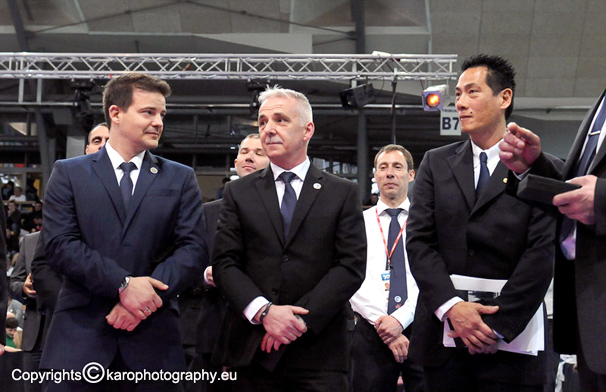
Mr Philip Lear, Master Sandy Dunbar, Master Jamies Tjin-A-Ton, and Mr Swen Heinrich - I would like to thank you for your hard and professional work as well as positive atmosphere from day one till the very end of the tournament. We couldn’t have imagined a better team to cooperate with.
